Inside: The most effective ways to get rid of ants in the garden naturally. No pesticides, no poisons…no more ants!
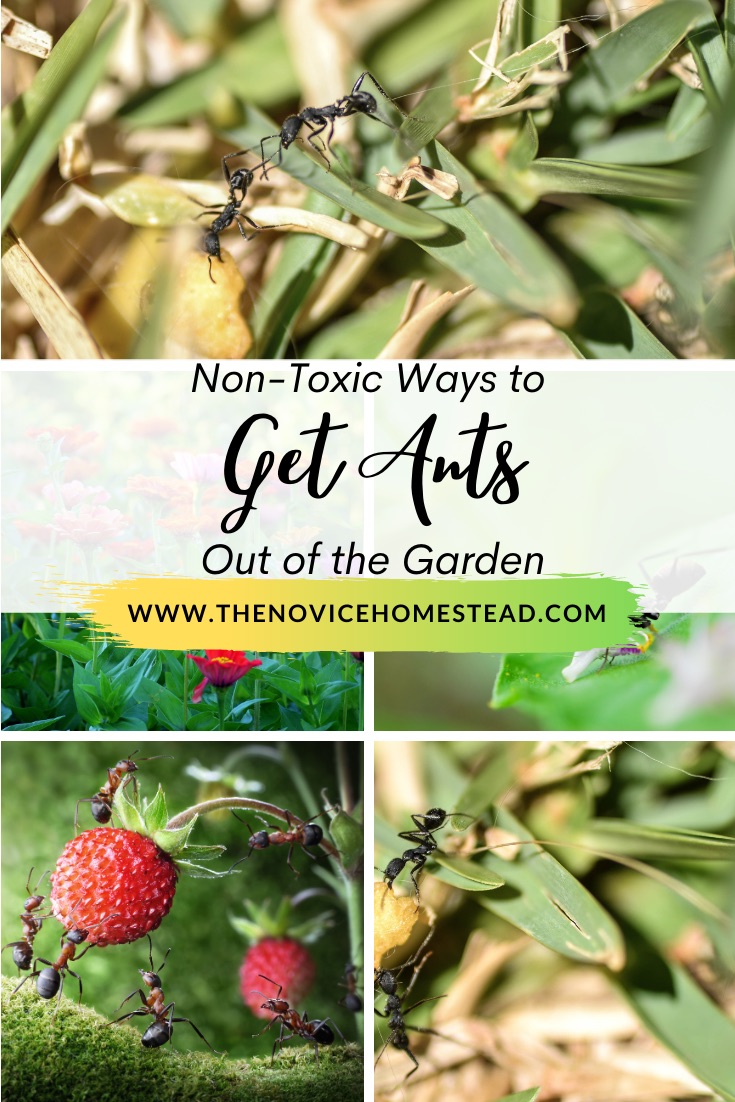
So you found an ant hill in the garden. Should you be concerned? We’ve got a breakdown of reasons you may want to get rid of ants in the garden, plus the most effective ways to do so.
Are Ants Bad for Your Garden?
In small numbers, most ants aren’t going to be an issue for your vegetable garden. In fact, some types of ants can be beneficial in these ways:
1. Ants Improve Soil Quality
Ants help to break up and aerate the soil — their underground tunnels allow air and water to get closer to plant roots. They also help break down organic material such as dead animals, insects, and decaying plant matter. They essentially help till the soil for you, simply by going about their daily business.
2. Ants Help Pollinate Plants
Pollination is crucial to healthy plant development and bearing fruit. Ants are actually unintentional pollinators because they carry pollen that is stuck to their legs from plant to plant.
3. Ants Provide Pest Control
Ants are a natural form of pest control because they feast on eggs, larvae, and even some other insects themselves.
Related: 8 Bugs That Are Good For Your Garden
What Types of Ants are Harmful?
While some ants may help your gardening efforts, there are some types of ants that are actually garden pests, such as fire ants and carpenter ants. In these cases, their negative behavior often outweighs potential benefits listed above.
Fire ants are extremely common here in Texas and they are definitely a pest to have in the garden or your backyard for that matter. I know from experience!
If I see a fire ant mound off in the pasture somewhere, I generally leave it alone. However, in my vegetable garden is another story and I have to take action.
Problem is, you can’t just dump poison all over your garden if you plan to harvest and eat that food. I’ll talk more about some of the non-toxic methods I use to kill ants later in the post.
First, here’s why you may want to consider getting ants OUT of the garden:
1. Fire Ants Sting
This is more of a logistical issue that one that directly affects a garden itself. However, fire ant stings can definitely make gardening an unpleasant experience or block access to certain areas.
Fire ants are quick to swarm and attack if you accidentally disturb their mound. Their stings HURT and can be especially dangerous to unsuspecting children and pets.
2. Ants May Eat Seeds or Sprouts
Fire ants can also be very destructive in the garden. Their mounds can disrupts seeds that you’ve planted. They also may eat fresh young sprouts, so that your garden does not grow. This can cause you to miss ideal planting times or end up with entire crops lost.
3. Ants “Farm” Other Harmful Insects
Yes, ants love to have certain other garden pests nearby. In fact, they love them so much that they may protect them!
An example that we’ve dealt with is aphids. A few days ago I discovered little green aphids on some of my pea plants. Coincidentally (so I thought) there was an ant hill in a nearby corner of the garden.
Turns out that ants love to eat the nectar produced by aphids, so they will protect those little green pests from other potential predators.
More ants…more aphids…more problems!
4 Ways to Get Rid of Ants in the Garden
Note: We’ve included shop-able ad links to products we love and use; read our disclosure policy here.
My first goal is to try to keep ants out of the garden in the first place. There are quite a few natural pest repellants that do help in this regard.
However, sometimes ants will sneak in and establish a base anyway, especially if there’s been a heavy rain that disrupted or destroyed their previous nest.
In that case, I move on to Plan B…extermination.
The following four methods for getting ants out of the garden are things that I have tried and really work. They are pesticide-free, non-toxic, and safe to do in a vegetable garden.
1. Boiling Water
This is a method I’ve seen suggested time and time again. Boil a large pot of water and pour it all over the ant colony. Ants will be killed on contact.
A couple issues with this method. First, it could be difficult to haul a big pot of boiling water out to the garden without splashing it on yourself. Secondly, if the queen is not hit and killed by the boiling water, the ant colony will likely rebuild.
Does it Work? Possibly. But from my experience, there are easier ways.
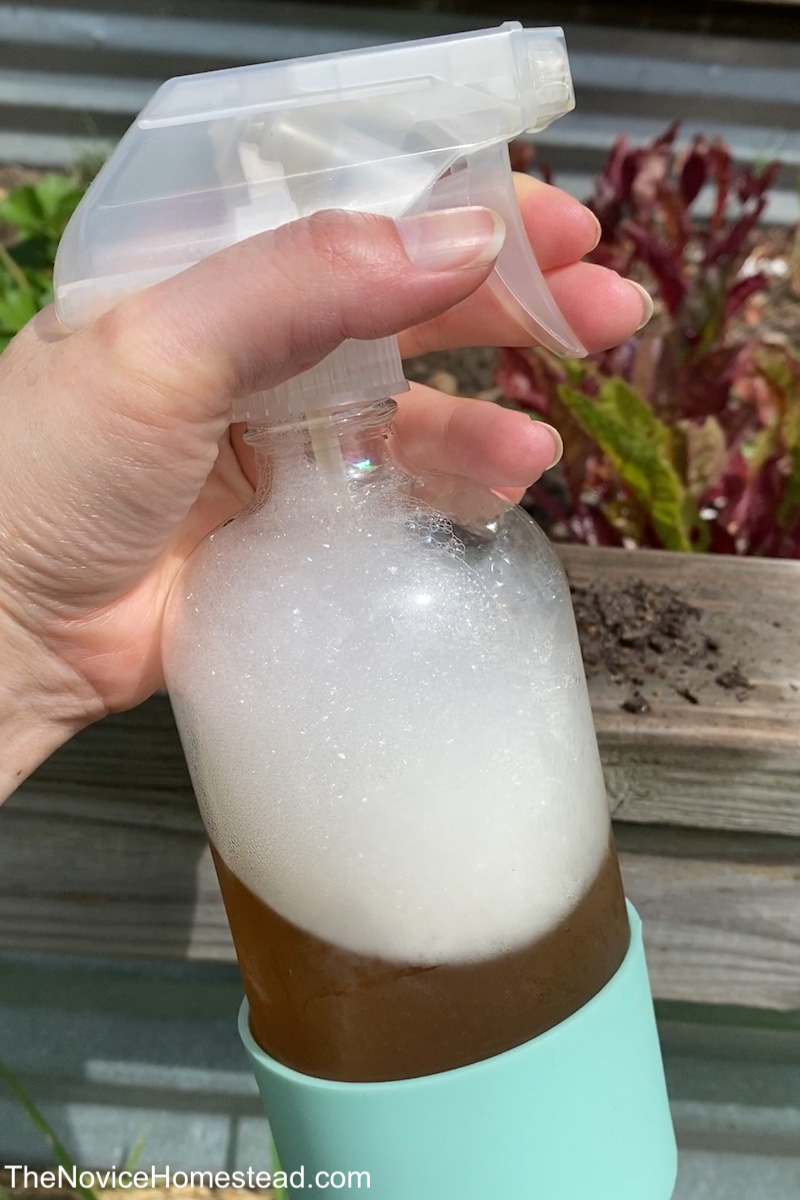
2. Vinegar Based Ant Spray
This DIY ant killer has been my go-to recipe for taking care of ants in the house for years. One spray and they’re dead. It’s also been effective for getting rid of ants that may have climbed onto my plants or into flowerpots.
My recipe includes dish soap and vinegar — the dish soap helps pull the vinegar through the ants’ exoskeletons. The vinegar kills them almost instantly.
However, like the boiling water method, this will only permanently destroy an ant colony if you’re able to find and kill the queen. And that is no easy task!
If applying this method to an ant hill and not individual ants, you’ll want to make a big batch so you can pour it on the mound and saturate the ground below. This will give you the best chance for getting rid of the group.
Does it Work? Yes for any ant that you can see. Might not work for an entire colony unless you get to the queen. This DID work extremely well for a nest of black widow spider babies that hatched in the corner of one of my garden beds. I wanted to make sure that none of those babies survived so I could garden safely. After one treatment with my spray, they were all dead.
3. Ant Wars
I saw this trick on YouTube and had to try it for myself. Basically, you pit two rival colonies against each other and they fight to the death.
To do so, use a large long-handled garden shovel to dig up an ant colony from the opposite end of the yard. You want to find a colony that’s far away to make sure they’re not the same colony or related.
Quickly carry the pile of ants you dug up over to your garden and drop them on top of the colony you wish to eradicate. Give the mix a little stir to get them all riled up.
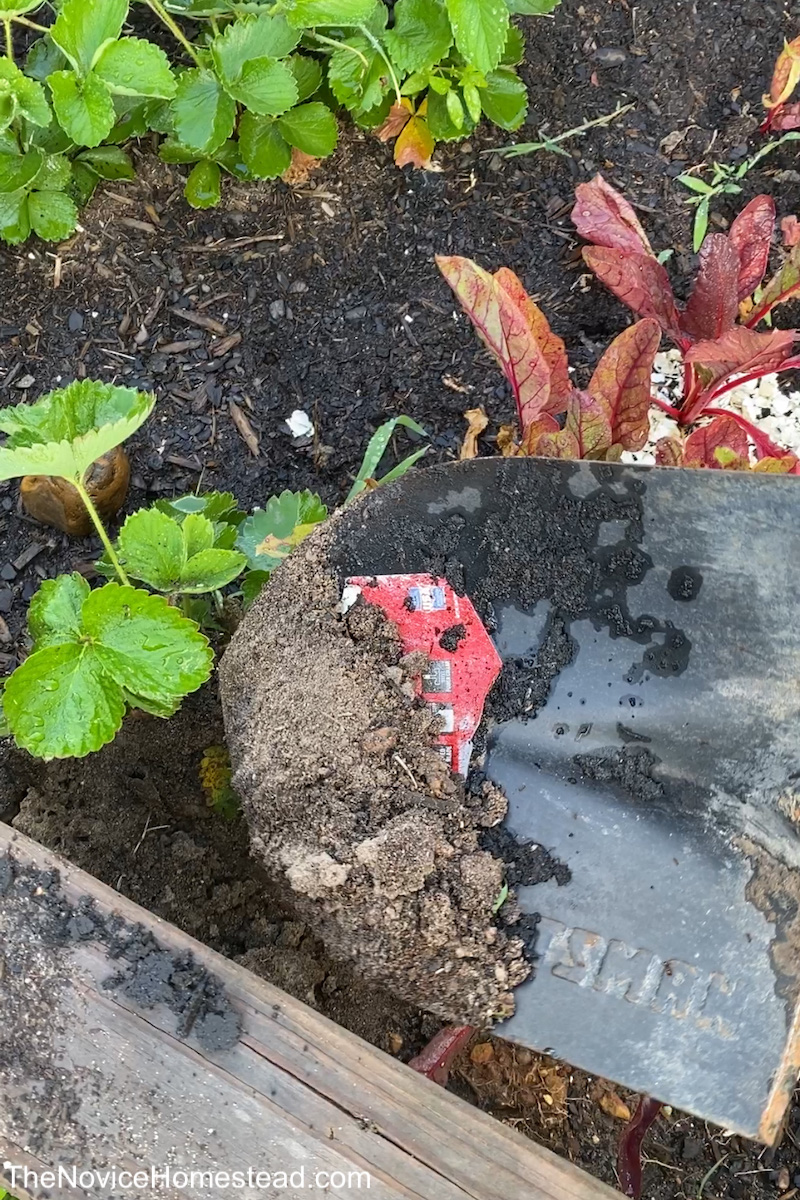
Does it Work? Yes! I’ve used this method numerous times with success. Every now and then I have to bring over a second batch of ants, but this has been one of the most successful methods I’ve tried. Plus, it is completely non-toxic and safe for your garden plants.
4. Diatomaceous Earth
Diatomaceous Earth is a substance made up of crushed skeletons of fossilized aquatic organisms called diatoms. To the naked eye, it looks like a fine white powder. However, to something the size of an ant, diatomaceous earth is more like small shards of glass.
There are a few ways you can apply diatomaceous earth to your garden to get rid of ants. First, you can scoop it directly on the ant mound. When ants leave the mound, they walk through the DE and are cut up. It can also coat their bodies and suffocate them.
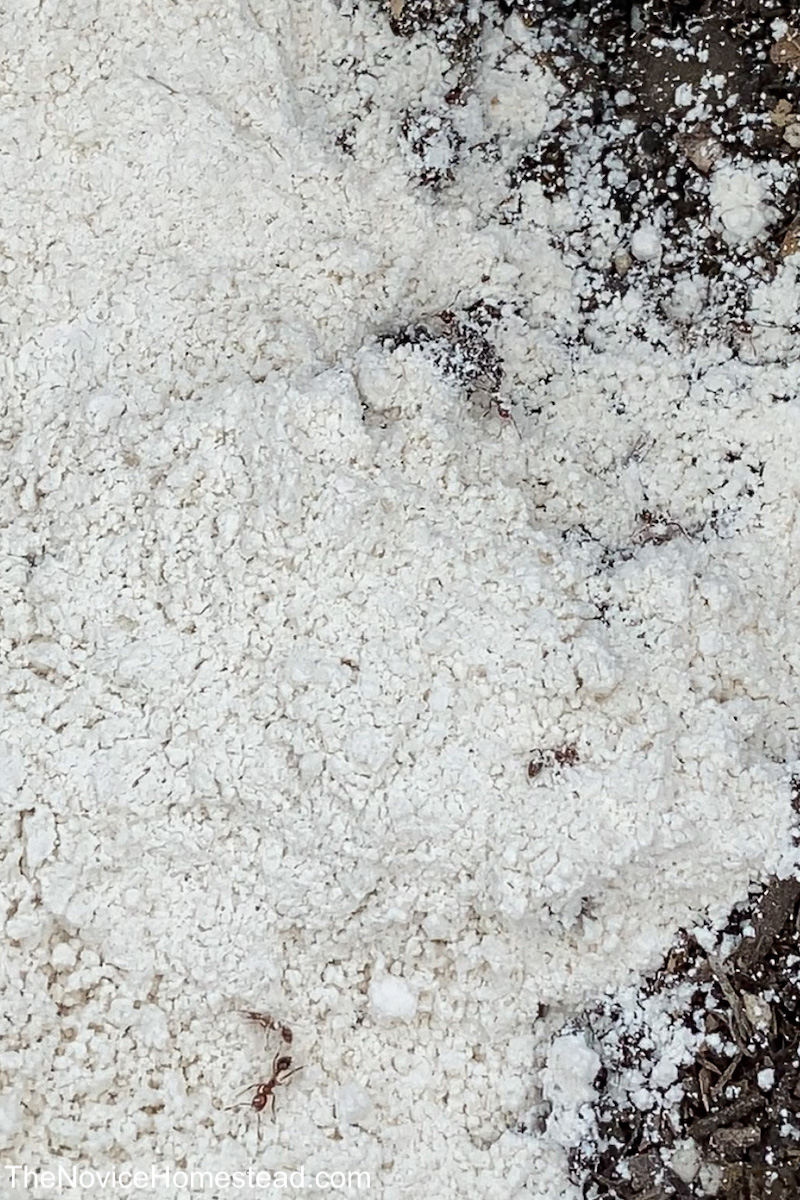
You can also mix sugar or cornmeal to the diatomaceous earth to act like a bait and attract ants more quickly. As an added bonus, when ants ingest cornmeal it expands and kills them.
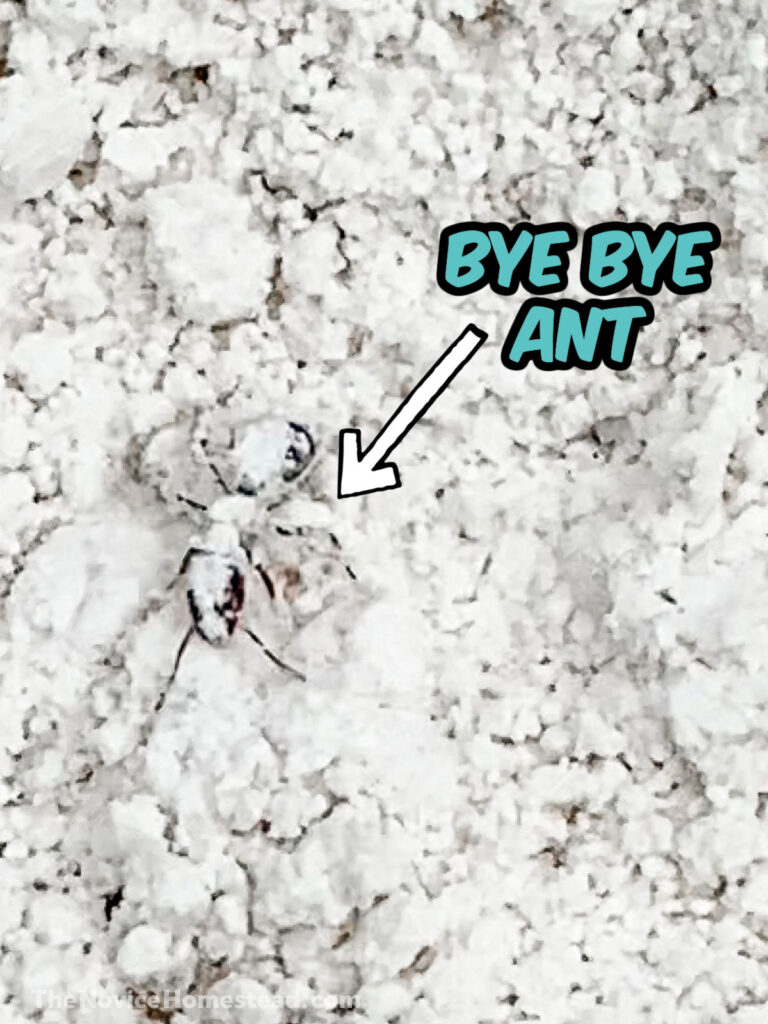
Does it Work? Yes. I’ve found the diatomaceous earth/cornmeal mix to be the most effective. Keep in mind that this is not an instant fix — it can take a few days for the ants to work through, eat the cornmeal/DE, and bring it back to the nest. You’ll also need to re-apply after watering or rain, as DE loses effectiveness when it gets wet.
Do you have any other methods not listed here that I should try? Drop me a line in the comments below!
Thanks for mentioning that dish soap and vinegar can help kill ants. I have lots of ants living on my deck and in my flower pots, and I want to get rid of them. I’ll have to try this and then I’ll call an exterminator to take care of it.
could I use diluted peppermint oil spray around my beehive to deter ants?
Hi Tracy, I am not familiar with raising honeybees, so I don’t want to offer information that could be incorrect on the subject.